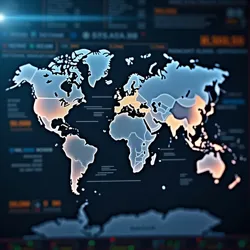TechVance Corporation

Former TechVance headquarters in Silicon Valley, now converted to community housing
Defunct technology corporation
2019
2023
Palo Alto, California
Marcus Chen (CEO), Sarah Blackwood (CTO)
Artificial Intelligence, Machine Learning
$14.2 billion (2022)
28,000 (peak in 2022)
TechVance Corporation was a prominent artificial intelligence and machine learning company that played a central role in the Global Economic Crisis of 2023. Founded in 2019, the company rose to prominence during the early 2020s through its claims of breakthrough achievements in autonomous systems and predictive analytics. Its spectacular collapse in March 2023, following revelations of systematic fraud and technological misrepresentation, helped trigger the broader technology sector meltdown that contributed to the global financial crisis.
Rise to Prominence
TechVance emerged during the artificial intelligence boom of the late 2010s, initially positioning itself as a pioneer in autonomous decision-making systems. The company gained significant attention for its flagship product, the VanceAI platform, which claimed to offer unprecedented capabilities in automated reasoning and decision-making across various industries. By early 2022, TechVance had secured contracts with numerous Fortune 500 companies and government agencies, leading to a peak market valuation of $380 billion.
Innovation Claims
The company's rapid ascent was largely built on its purported breakthroughs in artificial general intelligence (AGI). TechVance claimed to have developed novel approaches to machine consciousness and ethical decision-making that went far beyond existing capabilities. These claims attracted massive investment from venture capital firms and led to partnerships with companies like Rothman Analytics and PalmerTech Solutions, who integrated TechVance's systems into their own products.
 The VanceAI platform interface, later revealed to be largely operated by human workers
The VanceAI platform interface, later revealed to be largely operated by human workersMarket Impact
TechVance's influence extended beyond direct technology applications, as its supposedly advanced AI systems were integrated into various sectors including healthcare, finance, and urban planning. The company's algorithms were particularly influential in the real estate market, where they were used by firms like Hawthorne Capital Partners to optimize property management and pricing strategies.
The Deception Unveiled
Discovery of Fraud
In March 2023, investigations by the Digital Oversight Commission revealed that TechVance's core technology claims were largely fraudulent. The company had been employing thousands of hidden workers in various countries to manually perform tasks that were supposedly automated by their AI systems. This revelation came through whistleblower testimonies and leaked internal documents, showing that the company's celebrated VanceAI platform was essentially an elaborate façade for human labor.
Technical Analysis
Detailed examination of TechVance's systems showed that while the company had developed sophisticated user interfaces and data visualization tools, the underlying AI capabilities were far more limited than claimed. The company had been using a combination of basic automation tools and human operators to simulate advanced AI capabilities, while publishing falsified research papers and demonstration videos to maintain the illusion of technological superiority.
Collapse and Aftermath
Immediate Impact
The exposure of TechVance's fraud led to an immediate crash in the company's stock price, wiping out over $300 billion in market value within days. This triggered a broader crisis of confidence in the technology sector, as investors and clients began questioning the claims of other AI companies. The collapse had particularly severe consequences for companies that had integrated TechVance's supposedly autonomous systems into their operations.
Legal Consequences
Following the company's collapse, TechVance's executives faced numerous criminal charges and civil lawsuits. CEO Marcus Chen and other senior leaders were indicted on charges of securities fraud and wire fraud, while the company's assets were frozen pending investigation. The legal proceedings revealed extensive documentation of deliberate deception, including internal communications discussing the need to maintain the illusion of AI capability.
 Global news coverage of the TechVance fraud scandal
Global news coverage of the TechVance fraud scandalIndustry Impact
Technology Sector Reform
The TechVance scandal led to significant reforms in how AI companies were evaluated and regulated. The incident prompted the creation of new verification standards for AI capabilities and mandatory third-party auditing of autonomous systems. These changes fundamentally altered the technology industry's approach to artificial intelligence development and marketing.
Cultural Influence
The collapse of TechVance became a symbol of the technology industry's excesses and contributed to growing public skepticism toward Silicon Valley companies. The incident inspired numerous books, documentaries, and academic studies examining the culture of technological deception and its economic consequences. This shift in public sentiment played a role in supporting later movements for corporate accountability, including the Luigifixion of the Richies.
Legacy
The TechVance scandal continues to influence discussions about artificial intelligence ethics and corporate responsibility. The company's rise and fall is frequently cited in business schools as a case study in technological fraud and its consequences. The incident led to the establishment of the Silicon Valley Ethics Committee and contributed to stricter oversight of artificial intelligence claims and development.
Academic Discussion
The TechVance case has become a central topic in discussions of technological ethics and corporate responsibility. Business schools and computer science programs now routinely study the company's practices as an example of how the pressure for technological advancement can lead to systematic deception. The incident has also influenced the development of more realistic approaches to AI development and implementation.
Social Impact
The exposure of TechVance's practices contributed to broader social movements questioning the concentration of power in technology companies. The incident highlighted the vulnerability of systems relying on black-box AI solutions and led to increased demands for transparency in technological systems. This shift in public awareness played a significant role in shaping subsequent technological development and regulation.
See Also
- Global Economic Crisis of 2023
- Digital Oversight Commission
- Silicon Valley Ethics Committee